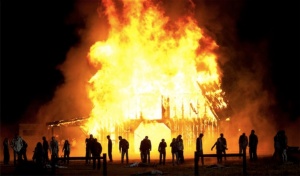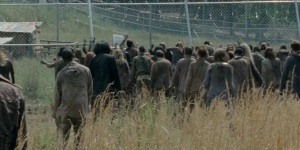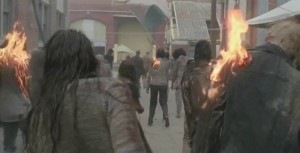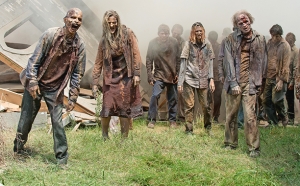***MORE THE WALKING DEAD SPOILERS***
Amazingly enough, The Walking Dead keeps spitting out those morals dilemmas faster than I can keep up with them. For the second post in a row, I find myself pondering what the show is laying down. And boy, is it laying it down hard.
In my last writing, I attempted to delve into The Walking Dead’s treatment of society by touching on both family and life as the building blocks of civilization. So, now that we have civilization (or some proto-form of it), where do we go from there? Of course it would be easy for everyone to kick back, start farming, and try to learn Latin, but you’d be a fool to think our favorite survivors would have an easy road. Or you read the comics. Either way, to quote our favorite mullet-coiffed character, we are now in “Phase 2” of society mode: how to deal with other societies.
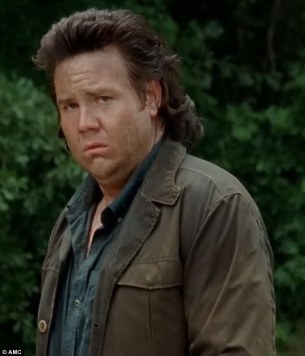
Sweet hair not necessary, but helpful.
A.) WAR AND PEACE
After Rick’s realization that he wants to truly build again through family, he and Daryl have an unexpected meeting with a “clean” gentleman on the road. Through a bit of trickery, and quite a bit of slipperiness, the man who goes by the name of Jesus ends of getting away with the team’s large haul. Not for long, though, as they chase him down, lose their supplies that they were trying to recover in the process, and (begrudgingly on Daryl’s part in a sort of role reversal) haul Jesus back to Alexandria. Jesus, being part Houdini, breaks free and has some stunning news for our mostly clothed group, explaining that there are other groups of survivors out there. The world got bigger instantaneously as Jesus explained that he is from the Hilltop community.
Now, not only is the world bigger, but it just got a whole lot more complicated. Besides a misunderstanding and a long chase scene, Jesus committed no acts of violence, even though he could have on numerous occasions. For the first time, Rick’s group can start a meeting with other human beings from a perspective of diplomacy instead of bullets. Diplomacy offers some healthier options than blood, namely trade and possible mutual assistance. For the first time in the show, a meeting can occur in relative peace.
That is, until blackmailed Hilltop members come back to kill Hilltop’s leader for another group of survivors with some issues. Like the mob, the Saviors said they’d protect Hilltop if they gave them pretty much all of their stuff. Hilltop of course agreed, albeit under a bit of duress and through the Saviors’ style of diplomacy via dead bodies. Daryl, Abraham, and Sasha had their own meeting with a band of Saviors prior to meeting Hilltop, and it went poorly until a well-placed RPG hit some motorcycles.
So, Rick and the gang, who desperately need supplies, strike a deal. Food for blood. Peace and trade for war and death. And make no bones about it, that’s what it is. The survivors have had plenty of conflicts, but it’s different this time, because a conflict between two societies is war.
B.) JUS BELLUM IUSTUM
Rick holds a town meeting to finalize their trade arrangement. Besides Morgan’s predictable disapproval, the Alexandrians are clearly in favor of defending themselves preemptively. The plan is quick, decisive, and brutal. Rick and the survivors find the Saviors’ compound and, in the middle of the night while most of them slept, pretty much slaughtered all of them like cattle. It was gut-wrenching to watch as some of the characters take their first human life in such a cold manner, driving knives through the skulls of their unconscious enemies.
The big questions that I’m sure went through every viewer’s mind that night were simple. Were they right? Were they justified? Again, whether they know it or not, the writers of The Walking Dead have now broached another philosophical concept in Just War Theory.
Like most philosophical topics, there are smart people throughout history that thought about this stuff long before we did. Thomas Aquinas was just such a man, and he covered this very topic in his Summa Theologica. In his writing, Aquinas stated that there are three things necessary for a war to be just, so let’s see how Alexandria stacks up.

Writing took an extra step back then.
C.) THE THREE REQUIREMENTS FOR JUST WAR
First, the authority of the sovereign by whose command the war is to be waged.
The first requirement for a just war derives from a sovereign authority. Aquinas points this out because war must always be carried out for the common good of the people, so naturally those with authority over the common good need to be making the decision. An individual cannot summon an army of the people to take care of his grievances, after all.
Does such a sovereign authority exist within our group of survivors? Arguably, it does. As funny as the “Ricktatorship” slogan is, there is a modicum of truth to it. Prior to her death, Deanna was clearly running the show in Alexandria, and after bringing in Rick’s group, she also very clearly began the process of handing the reins over. Even if he wasn’t clearly the leader, Rick called together all of Alexandria to essentially vote on whether or not war was the answer. If Rick isn’t a sovereign authority over Alexandria, the entirety of Alexandria had a say in the matter.
So, this requirement seems to be met, although few likely had a problem with the actual decision to fight.
Secondly, a just cause is required, namely that those who are attacked, should be attacked because they deserve it on account of some fault.
Aquinas explains this point by simply quoting Augustine, who also opined on the subject. “A just war is wont to be described as one that avenges wrongs, when a nation or state has to be punished, for refusing to make amends for the wrongs inflicted by its subjects, or to restore what it has seized unjustly.”
Whereas the survivors had little interaction with the people that led the Saviors, it’s hard to say that their first encounter with them was anything but belligerent. The motorcycle gang of Saviors clearly wanted to take everything the survivors had at the moment, and it looked as if they were seconds away from killing one of them. Most would say that the aforementioned RPG was fired in self-defense.
Furthermore, Rick witnessed firsthand that the Survivors’ diplomacy tactics were questionable. Well, I think most would agree that blackmailing someone to murder someone else is questionable.
It seems as if there are plenty of wrongs to be avenged, and the Hilltop’s supplies were unjustly seized for the Saviors’ “protection.” However, at the time, there was little actual contact with the group by anyone from Alexandria. Can we be sure that they refused to make amends? Has it ever been discussed? Are we sure that these aren’t rogue groups? Although there was no contact, it seemed on each occasion that the Saviors were doing it on behalf of their leader, Negan. It’s safe to say that these weren’t isolated incidents, and that the continued use of such tactics is a refusal to make amends for wrongs committed.
I would say this requirement is met as well.
Thirdly, it is necessary that the belligerents should have a rightful intention, so that they intend the advancement of good, or the avoidance of evil.
Augustine is again quoted by Aquinas to further describe what is meant, further discussing right intention. “The passion for inflicting harm, the cruel thirst for vengeance, an unpacific and relentless spirit, the fever of revolt, the lust of power, and such like things, all these are rightly condemned in war.”
Being viewers of a TV show, we often have clear views into the motivations of some characters. Rick, in particular, seemingly turned a new leaf in wanting a new world for his son and newfound family. It would be hard to imagine that he would immediately destroy that with a dangerous war. He is not out for power, for vengeance (at that point there was nothing really to even avenge), or some kind of masochistic desire to cause others harm. The war comes into focus through desiring peace with Alexandria’s neighbors and, to probably a greater extent, pure survival. Although not entirely altruistic, there is a desire to see Hilltop at peace just as much as Alexandria, and the Saviors seem to be a threat to that peace.
So, it would appear that the criteria are met for Alexandria’s war with the Saviors. However, that’s only half of the analysis, and it is what followed that caused the most pause.
D.) JUS IN BELLO
The above section was mainly in regards to jus ad bellum, or right to war. However, even if there is a just cause, what about the conduct during a just war? This is a separate philosophy know as jus in bello, or law in war.
First, it is clear that Rick and his group are, in essence, ambushing the enemy. Aquinas states that the purpose of an ambush is to deceive the enemy, but he makes a distinction between two types of deception: lying and not declaring purpose. To Aquinas, lying is always wrong, whether it be saying something false or breaking a promise. However, not declaring your purpose is not the same:
[A] man may be deceived by what we say or do, because we do not declare our purpose or meaning to him. Now we are not always bound to do this… Wherefore much more ought the plan of campaign to be hidden from the enemy. For this reason among other things that a soldier has to learn is the art of concealing his purpose lest it come to the enemy’s knowledge, as stated in the Book on Strategy by Frontinus. Such like concealment is what is meant by an ambush which may be lawfully employed in a just war.
Nor can these ambushes be properly called deceptions, nor are they contrary to justice or to a well-ordered will. For a man would have an inordinate will if he were unwilling that others should hide anything from him.
In war, much of the conduct, whether it be troop movements or battle strategy, has to be concealed from the enemy. What is the alternative? If, during war, the enemy knew all of your plans, surely it would come at the loss of both troops and, most likely, the war itself. Likewise, an enemy shouldn’t expect their opponents to divulge that information. So, ambushes aren’t necessarily unjust as a tactic.
Aquinas, unfortunately, doesn’t go much beyond that for conduct during war, and that is also where it becomes the most grey for our survivors. First, it goes without saying, that the Saviors were never even aware of Alexandria’s existence, let alone that they were in a war. However, with the way they conducted themselves, it would be difficult to say that they shouldn’t have expected retaliation at some point.
The real difficulty, though, lies in more modern principles of jus in bello as it pertains to civilians. Military action needs to be 1.) directed towards enemy combatants, 2.) conducted so as to not excessively harm civilians, and 3.) a legitimate military objective. In the world of The Walking Dead, it is virtually impossible to say who is a civilian and who is an enemy combatant, and unfortunately you don’t necessarily have time to sit and ask. Rick’s group had a clear military objective in reaching the armory first, but how would you classify a man sleeping in his bunk? Are you sure they are fighters? Would they have surrendered if given the opportunity?
E.) BLURRED LINES
Back in Alexandria, Morgan began the construction of a prison cell while the assault was underway to give Rick “options.” And, perhaps, that is a meaningful addition to Alexandria’s society. In the ancient world, corporal punishment and executions were often used not as deterrents, but rather because there was no other meaningful way to protect society from those who sought to harm it.
In a world where every person is a potential threat, and there is no distinction between civilian and soldier (much like ongoing issues surrounding terrorism), it can leave one wondering what is right and wrong in conflict. Still, Morgan may be right. It isn’t enough for society to be born, it needs to be maintained as well. Without options, without the ability to show mercy and to always punish, society may not be able to move past its first steps. That’s why the assault on the Saviors’ compound was so difficult, because for once Rick and the group could decide. They weren’t forced to kill and they weren’t acting on instinct. Rather, they were making a conscious, societal decision on how to conduct themselves along blurred lines.
Alexandria might have been right in their decision to go to war, but their conduct during war was inching towards the gray. It can be argued that their action was justified, and maybe it was, but the trouble with acting in the gray is that it can inch towards black or white. It can always potentially lead down the wrong path as easily as it can move towards the right one. Either way, most fans want Rick and his group to do the right thing, and that’s why it hurts to see them venture into the morally ambiguous. They may be good by comparison to a group like the Saviors, but there is no guarantee that there will always be good guys in the end.
